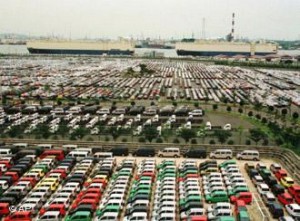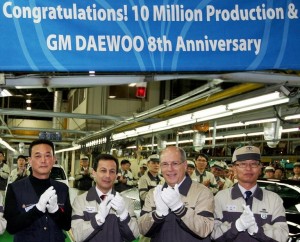Two of the biggest auto industry opponents of the controversial Korean Free Trade Agreement or FTA – Ford Motor Company and the UAW – have now endorsed it following modifications made late last week.
The revised deal keeps tariffs on Korean auto exports to the U.S. while eliminating them on U.S. automotive exports to Korea.
There is of course a breathtakingly large disparity between Korean auto sales in the U.S. by Hyundai and Kia and the minuscule American car sales in Korea, heretofore a closed, protected market. Both Hyundai and Kia set U.S. sales records here in November for a combined total of more than 800,000 vehicles year-to-date. They pay as little as $12 an hour for non-union assembly line workers here.
After more than a decade of trying, Ford Motor Company sells less than 1,700 vehicles a year in South Korea. Ford turned down the opportunity to buy Kia during the Asian financial crisis a decade ago.
Korea ranks at the very bottom — 30 out of 30 among the largest automotive markets — for auto import market access. The average among major developed economies is approximately 40% market penetration by imported automobiles, but in 2006 in Korea, the total of import vehicles from all global manufacturers in all countries entering the Korean market was around 3.6%. This is about 40,000 vehicles in a market that buys roughly one million vehicles annually.
Whether a divided Congress approves what is the largest Asian Trade Pact in U.S. history remains to be determined, but the deal appears to have rare bipartisan support. If approved, South Korea would be the only country in the world with essentially free access to Europe and the United States – the world’s largest non-communist economies.
Large questions remain whether this is a good move by the U.S.
The revised Korean Free Trade Agreement eliminates tariffs on more than 95% of industrial and consumer goods within five years, according to the White House. But it also protects the Korean beef and pharmaceutical industries.
In the revised agreement 25,000 cars per U.S. automaker can be imported into Korea, provided they meet U.S. federal safety standards, even though they do not meet Korean standards, which are designed to exclude imports.
“The Agreement will promote the further integration of the U.S. and Korean economies and enhances the competitiveness of U.S. businesses in the world’s 12th largest economy,” President Obama said in a statement.
The 2007 agreement would have required the United States to start reducing its tariff on Korean trucks immediately, phasing it out by the tenth year. The 2010 supplemental agreement allows the United States to maintain its 25% truck tariff until the eighth year and then phase it out by the tenth year – but holds Korea to its original commitment to eliminate its 10% tariff on U.S. trucks immediately.
“President Obama, Vice President Biden and their administration gave the labor movement, and particularly the UAW, an opportunity to be part of the discussions about this agreement,” the UAW said in a statement late yesterday.
“Working in collaboration with the Obama Administration, Congressman Levin, Congressman Dave Camp, and top management from the auto companies, especially Alan Mulally of Ford, we believe an agreement was achieved that will protect current American auto jobs, that will grow more American auto jobs, that includes labor and environmental commitments, and that has important enforcement mechanisms,” the UAW said.
As originally negotiated under Republican President Bush in 2007, the KFTA would have done nothing to address a growing trade imbalance with Korea which according to critics continued decades of failed U.S. policy – or non policy – that decimated jobs for U.S. workers in the automotive sector and virtually all other manufacturing businesses as export-oriented nations had access to the U.S. market while protecting their home markets.
Unemployment in the U.S. remains at post WW2 highs and neither party appears to have anything beyond rhetoric about job creation that supports their demonstrably failed prior positions. This cost the Democrats huge losses in the mid-term elections, and now the pressure is on Republicans to prove they can manage the economy, reduce the deficit and create jobs.
U.S. unemployment officially rose to 9.8% in November, and even jobs in the retail sector declined as the holiday shopping season go under way. (See U.S. Unemployment Rises to 9.8% in November)




GM by way of it ownership of Daewoo has a substantial position in Korea, unlike Ford. Chevrolet will be introduced in Korea in 2011. GM Daewoo was formed from the extinct Daewoo Group, which went bankrupt in 1999. It has five manufacturing facilities in Korea as well as an assembly facility in Vietnam. GM Daewoo also provides vehicle kits for assembly at GM facilities in China, Thailand, India, Colombia and Venezuela. GM Daewoo sells in Korea and exports almost two million units annually.
GM Daewoo has been one of the world’s fastest-growing vehicle producers over the past eight years. Between October 17, 2002, when the company was established, and the end of September 2010, it produced 11,129,597 units, including 5,342,908 complete vehicles and 5,786,689 complete knockdown (CKD) kits for assembly outside Korea.
GM Statement on FTA:
General Motors congratulates U.S. and Korean trade negotiators for successfully addressing many of the concerns related to auto trade in the U.S.-Korea Free Trade Agreement (FTA). We are pleased that the two governments have agreed to delay the phase-out of U.S. vehicle tariffs. This delay will allow the U.S. to assess whether Korea’s market has opened as negotiated before reducing its tariffs. GM is especially pleased that the negotiators agreed to address concerns of American auto manufacturers regarding non-tariff barriers in Korea by increasing the number of vehicles to 25,000 that can be imported into Korea under a small volume exemption. We are also pleased that the two countries agreed to add an auto specific safeguard provision and to accelerate the phase-out of tariffs on electric and extended range electric vehicles. GM will continue to work with the USTR, UAW, and the Korean government to ensure the FTA matches the spirit of fairness that all parties have worked hard to achieve and creates greater access to the Korean auto market.